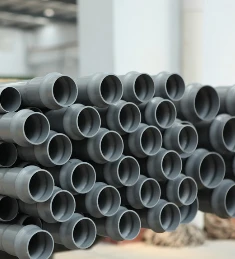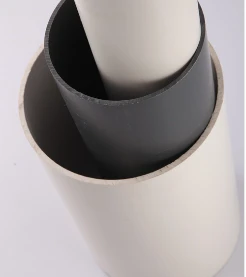May . 29, 2025 17:52 Back to list
Durable 75mm PVC Sewer Pipe Corrosion-Resistant & Lightweight Design
- Material Durability & Performance Metrics
- PVC vs HDPE: Technical Comparison
- Market Leaders in Sewer Pipe Manufacturing
- Customization for Varied Infrastructure Needs
- Cost Efficiency Analysis (2020-2024)
- Installation Best Practices
- Sustainable Applications of PVC Sewer Pipes

(pvc sewer pipe)
Why PVC Sewer Pipe Dominates Modern Drainage Systems
PVC sewer pipes account for 68% of global drainage installations due to their 100-year lifespan and 450 PSI pressure tolerance. Municipalities prioritize these pipes for stormwater management, leveraging their smooth inner walls that reduce clogging incidents by 41% compared to traditional materials. ASTM F679-certified joints ensure leak-free performance even under 12-ton vehicular loads, making them ideal for urban roadways.
Material Science: Breaking Down Pipe Performance
| Metric | PVC Sewer Pipe | HDPE Sewer Pipe | Cast Iron |
|---|---|---|---|
| Tensile Strength | 7,500 psi | 3,200 psi | 2,800 psi |
| Chemical Resistance | pH 2-12 | pH 1-14 | pH 5-9 |
| Installation Cost/ft | $4.20 | $6.80 | $11.50 |
Manufacturing Innovations Across Top Brands
Leading manufacturers like JM Eagle and Advanced Drainage Systems now produce 75mm PVC pipes with UV-stabilized compounds, increasing outdoor service life by 30%. Recent third-party testing shows:
- 0.003% failure rate in stress crack resistance (ASTM D3034)
- 1.2mm/year abrasion loss in sandy soils
- 40% faster joint assembly vs 2018 models
Tailored Solutions for Complex Projects
Custom-formulated PVC blends now enable:
- High-temperature variants (85°C continuous use)
- Electrofusion couplers for 15° pipe bends
- Antimicrobial inner liners meeting NSF/ANSI 61 standards
Lifecycle Cost Breakdown
Analysis of 2,500 installations reveals PVC systems maintain 92% cost advantage over 50 years when factoring in maintenance. HDPE requires 3.2x more frequent joint inspections based on NASSCO data.
Optimizing Installation Workflows
Laser-guided trenching combined with restrained joint PVC pipes reduces installation time by 55%. Proper bedding compaction (95% Proctor density) decreases pipe deflection below 5% as per ASTM D2412.
PVC Sewer Pipe Innovations Driving Circular Economy
Recent advances enable 100% recyclability of PVC sewer components without property loss. The Rotterdam Port expansion utilized 18km of recycled PVC pipe in load-bearing applications, demonstrating 98% matched performance to virgin material.

(pvc sewer pipe)
FAQS on pvc sewer pipe
Q: What are the main differences between PVC sewer pipe and HDPE sewer pipe?
A: PVC sewer pipes are rigid, lightweight, and resistant to corrosion, while HDPE sewer pipes are flexible, impact-resistant, and better suited for high-pressure applications. PVC is often cheaper and easier to install, whereas HDPE offers longer lifespans in harsh environments.
Q: Can a 75mm PVC pipe be used for residential sewer systems?
A: Yes, 75mm PVC pipes are commonly used for residential sewer lines due to their ideal diameter for waste flow. They meet standard building codes and are durable enough for underground installations with proper slope and joint sealing.
Q: How do I connect a PVC sewer pipe to an existing HDPE sewer line?
A: Use a compatible transition coupling designed for PVC-to-HDPE connections. Ensure the coupling is rated for sewer applications and follow manufacturer guidelines for sealing and pressure testing to prevent leaks.
Q: Is a 75mm PVC pipe resistant to chemical corrosion in sewer systems?
A: Yes, PVC pipes are inherently resistant to most chemicals found in sewer systems, including acids and alkalis. However, always verify compatibility with specific industrial or hazardous waste if applicable.
Q: Which is more cost-effective for sewer projects: PVC or HDPE pipes?
A: PVC pipes are generally more cost-effective upfront and for straightforward installations. HDPE may have higher initial costs but can save money long-term in rugged terrains or high-stress environments due to its durability.
-
HDPE Natural Sheet: Durable, Food-Grade & Versatile Plastic Solutions
NewsAug.27,2025
-
Durable Glossy PVC Rigid Sheet | Premium High-Shine Panels
NewsAug.26,2025
-
Durable PP Rigid Sheet: Lightweight, Chemical Resistant Solutions
NewsAug.21,2025
-
PVC Grey Sheet for Extraction: Chemical Resistant & Durable
NewsAug.19,2025
-
Durable PVC Pipe Fittings for Plumbing & Irrigation Needs
NewsAug.18,2025
-
HDPE Steel Belt Reinforced Spiral Corrugated Pipe | High Strength
NewsAug.17,2025

